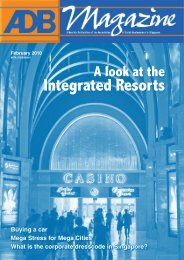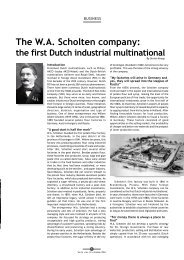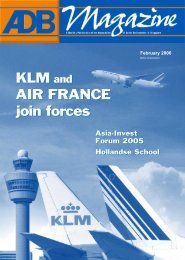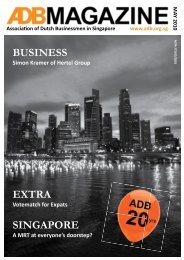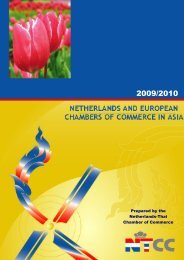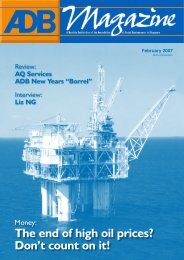October - November 2012 - Association of Dutch Businessmen
October - November 2012 - Association of Dutch Businessmen
October - November 2012 - Association of Dutch Businessmen
Create successful ePaper yourself
Turn your PDF publications into a flip-book with our unique Google optimized e-Paper software.
Bizz News<br />
Greek eurozone withdrawal would cost the Netherlands €22bn: ING<br />
The collapse <strong>of</strong> the eurozone would not only cause a major recession in the Netherlands, but would cost the country<br />
hundreds <strong>of</strong> billions <strong>of</strong> euros in lost assets, according to economists. In total, the cost to the country would be €339bn, <strong>of</strong><br />
which banks’ finances would contract by €111m and the government’s by €121bn, the report said. If rather than a total<br />
collapse, Greece left the eurozone instead, the impact on the <strong>Dutch</strong> economy would be around €22bn.<br />
Manageable<br />
Of this, the government would have to write-<strong>of</strong>f €17.75bn and the private sector the rest. ‘That will hurt, but it does not<br />
have to lead to insurmountable problems for the country,’ the report said. ‘So at first sight, a Greek withdrawal would<br />
be manageable.’ However, ‘the biggest problem would be that a Greek pull-out could trigger a domino effect,’ the report<br />
concluded. The best option for the eurozone crisis is to ensure the survival <strong>of</strong> the euro, but it is impossible to say how<br />
much that would cost the country, the report said.<br />
Hotel prices<br />
remain high in the<br />
Netherlands<br />
The price <strong>of</strong> a hotel room in<br />
the Netherlands remains high<br />
despite the economic crisis, with<br />
the average rate at €110 a night.<br />
Only Finland’s hotels are slightly<br />
higher, according to figures<br />
released in the ING Hotel Price<br />
Index. Hoteliers in other tourist<br />
countries such as Italy, Spain and<br />
France have slashed prices. Hotel<br />
rates throughout the Netherlands<br />
are influenced by the prices in<br />
Amsterdam, where the dearth<br />
<strong>of</strong> hotel rooms means the price<br />
can remain high, said Jan van der<br />
Doelen from ING. The average<br />
price <strong>of</strong> a room in Amsterdam is<br />
€123 a night.<br />
Financial sector sees drop in consumer<br />
confidence<br />
Consumer confidence in the financial sector fell again in <strong>2012</strong>, according to<br />
research by Porter Novelli among 500 people over the age <strong>of</strong> 18. Of those<br />
questioned, 66% were critical about banking bonuses and 87% thought<br />
financial products are too complex, the research shows. ‘Of course the<br />
economic crisis does not help, but it is clear the financial sector must<br />
itself take steps to win back confidence,’ said Porter Novelli’s Frank Peters.<br />
According to Peters, banks, insurers and pension funds must renounce the old<br />
financial world culture and be seen to do so.<br />
State-owned railway group NS uses Ireland to dodge <strong>Dutch</strong> taxes<br />
The state-owned <strong>Dutch</strong> railway company NS has managed to cut its <strong>Dutch</strong> tax bill by at least €250m since 1999 by routing<br />
the cost <strong>of</strong> new trains through Ireland. The tax dodge means the treasury has lost out on income generated by a company<br />
it owns. The finance ministry, meanwhile, is said to be ‘unhappy’ about the arrangement, which it has been aware <strong>of</strong> from<br />
the beginning. In effect, NS’s Irish subsidiary, NS Financial Services, has spent €1.7bn on new trains which it then rents to<br />
the NS in the Netherlands. None <strong>of</strong> the trains has ever been used on the Irish railways.<br />
Dividends<br />
This allows the <strong>Dutch</strong> operation to avoid tax. In Ireland, railway companies have paid an average 9% tax on their pr<strong>of</strong>its in<br />
recent years. In the Netherlands, NS would have to pay 25% pr<strong>of</strong>it tax on the train rental. Some <strong>of</strong> the ‘missing’ cash does<br />
end up with the treasury in the form <strong>of</strong> dividends. In a statement, the NS said the tax route had been developed to allow<br />
it to ‘better compete in the market’. Other large transport firms also use Ireland to reduce their tax liabilities and there<br />
is nothing illegal about this, the NS said. There is effectively no competition on the <strong>Dutch</strong> railways and NS operates all<br />
intercity and most local train services.<br />
Morals<br />
Political party leaders were quick to react to the news. CDA leader Sybrand Buma said it showed a ‘lack <strong>of</strong> morals’. Labour<br />
leader Diederik Samsom said the NS had used a ‘bizarre construction which just is not right’, and an SP spokesman said<br />
the situation is ‘unacceptable’. Caretaker tax minister Frans Weekers said: ‘Of course, we would rather have seen these<br />
activities take place in the Netherlands.’ Economist Martin Holterman, who is an expert on the <strong>Dutch</strong> railways, said the NS<br />
is busy ‘playing at being a company’. But the NS is not a company but a government service, he said.<br />
20




